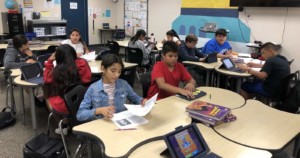Culturally Responsive Online Teaching: A Call to Action
This blog post was written by Andrew Miller: [email protected]
Online Education can help solve the issues of equity and access for students across the United States. I hear fantastic stories of about students being to be successful in graduating from high school. Just this week Susan Sawyers wrote an article for USA Today showcasing how some students are using online course to graduate on time. It’s a great window into the potential, and echoes many stories I hear from students, families and community members who an experiencing online education. A diverse population of students was able to take classes in order to retrieve credit for classes they may have failed in the past. Question: How could online learned have helped solve this in the first place? We know there are many online course providers, as well as online schools that provide of a variety of choice for online and hybrid schools. It is a budding area of education that we know is paving the way for equity and access, but it does have its potential pitfalls. A researcher in online learning recently publishing an article that examined culture in distance learning:
“Distance learning environments are by no means immune to the problems arising from cultural differences. In fact, these environments may even be more prone to cultural conflicts than traditional classrooms as instructors in these settings not only interact with students who have removed themselves from their native culture, but they also interact with students who remain ‘physically and socially within the different culture, a culture that is foreign to, and mostly unknown, to the teacher.” – “Questions of Culture in Distance Learning: A Research Review” – Sedef Uzuner
Geneva Gay recently printed a new edition of her book, Culturally Responsive Teaching: Research, Theory and Practice, and it explains the many of the dispositions and practices teachers need to have. The next step is to ensure this sort of practice occurs consistent in online course instruction. We need to remember that simply having access to great online courses does not mean they will be culturally responsive, nor does it mean the teachers themselves will be. We need to ensure we train our online educators with the tools and skills it takes to interact with students of diverse populations, especially as more students begin taking more courses online. Culture of course includes a variety of identifies and aspects, from race, ethnicity and gender; to religion, socio-economic status and place. I would also propose that teachers need to utilize the online culture that we know exists with these students. All students have cultural strengths and resiliencies; we need to ensure we are using all these strengths, including the culture of online learning.
Related articles
- Online distance learning provides education solution for Armed Forces (prweb.com)
- Finding Technology Support When Distance Learning – Where to Turn? (brighthub.com)
- Online & Distance Learning Courses in Filmmaking, Video and Media (brighthub.com)
- All About Online Learning (socyberty.com)
- Implementing Best Practices when Teaching in an Online Learning Environment (brighthub.com)








Get GED Online
Simply love this article, after reading it i am your fan.